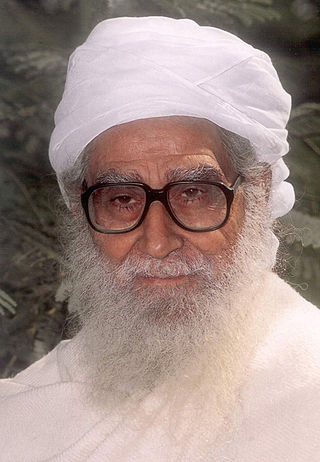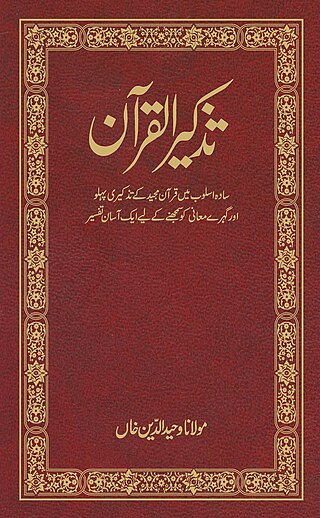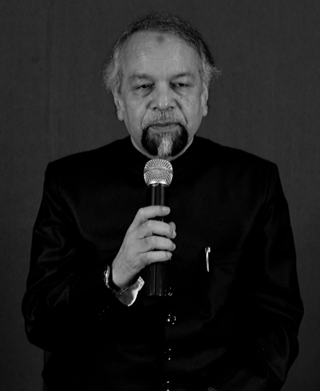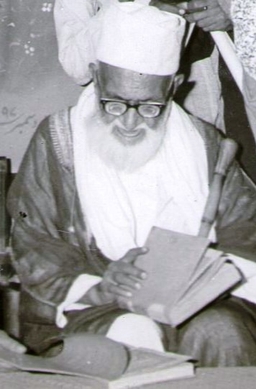
Translations of the Qurʻan are considered interpretations of the scripture of Islam in languages other than Arabic. The Qurʻan was originally written in the Arabic language and has been translated into most major African, Asian and European languages.

Muhammad Tahir-ul-Qadri is a Pakistani–Canadian Islamic scholar and former politician who founded Minhaj-ul-Quran International and Pakistan Awami Tehreek.
Contemporary Islamic philosophy revives some of the trends of medieval Islamic philosophy, notably the tension between Mutazilite and Asharite views of ethics in science and law, and the duty of Muslims and role of Islam in the sociology of knowledge and in forming ethical codes and legal codes, especially the fiqh and rules of jihad. See list of Islamic terms in Arabic for a glossary of key terms used in Islam.
Following is a list of English translations of the Quran. The first translations were created in the 17th and 19th centuries by non-Muslims, but the majority of existing translations have been produced in the 20th and 21st centuries.

Wahiduddin Khan, known with the honorific "Maulana", was an Indian Islamic scholar and peace activist and author known for having written a commentary on the Quran and having translated it into contemporary English. He was listed in "the 500 Most Influential Muslims" of the world. He was also the founder of the Centre for Peace and Spirituality (CPS). In 1993, he asked the Muslims to relinquish claims over Babri Masjid site. Khan had also embarked on a peace march through Maharashtra along with Sushil Kumar and Chidanand Saraswati post the demolition of the Babri Masjid. Khan wrote over 200 books on several aspects of Islam and established the Centre for Peace and Spirituality to promote interfaith dialogue.
Nizamuddin West is an upscale residential locality, conveniently located south of India gate. It is a historically busy neighbourhood in Central Delhi and has many parks and trees. It sits in the green lung of delhi, with Humayun's Tomb, Sunder Nursery and Delhi Golf club around it. The popular landmarks around it are Khan Market, Lodi Garden, Oberoi Hotel. It is well connected with Public transport.

Saniyasnain Khan is an Indian television host and children's author of over 100 children's books on Islamic topics. He established Goodword Books in 1999.
Madrasatul Islah is a traditional Islamic institution of learning and a renowned center of oriental and Islamic studies at Sarai Mir in the Azamgarh district of Uttar Pradesh. It was started by Mawlana Muhammad Shafi in 1908 along with participation of prominent scholars and religious seminaries of the area. The madrassa was established with a different syllabus and ideology than that of Darul Uloom Deoband and Darul Uloom Nadwatul Ulama. Shibli Nomani and Hamiduddin Farahi are regarded as chief architects of this madrasa.

Tazkirul Quran is an Urdu translation and commentary on the Qur'an, written by Maulana Wahiduddin Khan, in 1985. First published in Arabic in 2008 from Cairo as al-Tadhkir al-Qawim fi Tafsir al-Quran al-Hakim, the work has also been translated into Hindi and English. The English version was published by Goodword Books in 2011 as The Quran Translation and Commentary with Parallel Arabic Text.
Quranism or Qur'anism is a movement within Islam. It holds the belief that divine law should be derived solely from the Quran.

Muhiuddin Khan was an Islamic scholar from Bangladesh and editor of Monthly Madina. Khan was also a Quranic commentator, journalist, poet, writer and translator. He translated for the first time tafseer Maariful Quran into Bengali.

Syed Abdullah Tariq is an Indian Islamic scholar, author and philanthropist who established the World Organization of Religions and Knowledge (WORK), an international interfaith organization based in India.

The Quran is the central religious text of Islam, believed by Muslims to be a revelation from God. Translation of the Quran into Hebrew was first completed in the mid-19th century.

Farida Khanam is an Islamic scholar, speaker, author, translator, and peace activist. She spent more than two and half decades teaching Islamic Studies at Jamia Millia Islamia, New Delhi, India where she also earned her Master's and PhD. She is the current chairperson of CPS International. She is the daughter of the noted Islamic Scholar Maulana Wahiduddin Khan and has edited and translated his commentary of the Quran, Tazkirul Quran into English. Prof. Farida Khanam is the editor-in-chief and translator of many of Maulana Wahiduddin Khan's works.

Obaidullah Hamzah is a Bangladeshi Islamic scholar, educator and economist. He is the sixth Director-General of Al Jamia Al Islamia Patiya and the head of its Arabic department. He is also the secretary-general of the Bangladesh Tahfizul Quran Organisation, Chairman of the sharia supervisory committee of Islami Bank Bangladesh Ltd and Social Islami Bank Limited, assistant editor of the Bengali monthly At-Tawhid and the chief editor of Arabic magazine Balagh ash-Sharq.

The earliest Quran translations into Bengali occurred in 1389, when Shah Muhammad Sagir translated surahs of the Quran into the old Bengali language. However, full translation of the Quran from Arabic to Bengali began in the early nineteenth century.

This bibliography of Abul Hasan Ali Hasani Nadwi is a selected list of generally available scholarly resources related to Abul Hasan Ali Hasani Nadwi, a leading Islamic scholar, philosopher, writer, preacher, reformer and a Muslim public intellectual of 20th century India, the author of numerous books on history, biography, contemporary Islam and the Muslim community in India. He wrote a 7 volume autobiography in Urdu titled Karwan-e-Zindagi in 1983–1999. In this work, he tried to cover all the information related to himself as well as the remarkable events of his life. This list will include his biographies, theses written on him and articles published about him in various journals, newspapers, encyclopedias, seminars, websites etc. in APA style.

This bibliography of Abdul Majid Daryabadi is a selected list of generally available scholarly resources related to Abdul Majid Daryabadi, an Islamic scholar, philosopher, writer, critic, researcher, journalist and exegete of the Quran in Indian subcontinent in 20th century. He wrote an autobiography in Urdu titled Aap Biti, published in 1978. In this work, he tried to cover all the information related to himself as well as the remarkable events of his life. This list will include his biographies, theses written on him and articles published about him in various journals, newspapers, encyclopedias, seminars, websites etc. in APA style.
Tabeer Ki Ghalti is a 1963 Urdu book by Wahiduddin Khan. The book is a critique of Abul A'la Maududi's interpretation of Islam in general and his book Quran Ki Chaar Buniyadi Istlahein in particular. The book was the reason for author's exclusion from Jamat e Islami.












